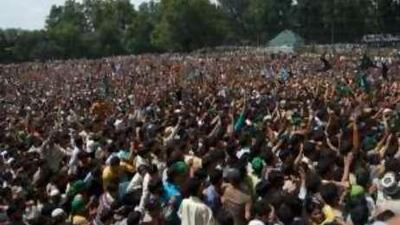SRINAGAR, INDIA // In the biggest mass protest Kashmir has seen in more than a decade, hundreds of thousands of people took to the streets of the state capital, demanding independence from India. Yesterday morning, soldiers and police fortified positions in Srinagar's central corridor, but eventually had to fall back as Kashmiris poured in from all parts of the state.
"If we are simply walking the streets, they better not stop us," said Noor Mohammed, a houseboat owner, who took part in the rally. "Because it is not simply one or two people. It is hundreds of thousands of people. After 20 years, we have this opportunity to take." While the rally culminated in the city's main park, thousands more protesters defied military and police lines to deliver a memorandum to the city's UN office demanding intervention.
Kashmiris from villages across the state of Jammu and Kashmir rumbled into the capital, waving flags and blaring "Jinnah! Jinnah! Pakistan!", referring to Muhammad Ali Jinnah, Pakistan's founder, and acknowledging a kinship the region has forged with its northern neighbour. Although many Kashmiri leaders said they want to be free of both countries, it was hard to ignore the seemingly deliberate jabs at New Delhi.
Relations between India and Pakistan continue to unravel over the Kashmir issue. Over the past week, border skirmishes have become increasingly more common, with mortar and machine gunfire being exchanged on both sides. Scenes of protesters vandalising banks with the words "Bank of Pakistan" yesterday were unlikely to ease anxieties in New Delhi, which has more than 500,000 military personnel stationed in the region.
The troubled state is divided between Pakistan and India by the Line of Control, or LoC - a border that Kashmiris want eliminated so they can sell their fruit and vegetables on either side. While the Indian government had promised to negotiate the LoC with Pakistan, it has not happened soon enough for Kashmiris. To exacerbate the situation, Hindu activists from the Jammu region of the state have launched their own protest, blocking the Srinagar National Highway. Several lorry drivers have been beaten and burnt trying to enter Srinagar.
"How do you expect any one from here will go with a lorry, when they are being treated like this on the motorway in Jammu?" asked Shahid ul Islam, press secretary for Umar Farooq, a separatist leader. "The government has 500,000 troops here. They could easily get things done on the motorway. But they don't want that." The recent conflict in Kashmir dates to early June, when the state government announced it would transfer a 40-hectare tract of forest to the management of a Hindu cave shrine called Amarnath. The land, however, lay squarely in the Muslim-dominated Kashmir Valley. Within days Kashmiris flooded the streets in protest, and by June 23, seven had been killed by security personnel. The state then announced it was cancelling the land deal.
The Hindus of Jammu soon exploded in protests of their own, but Kashmiris have borne the brunt of the police actions, with 30 people killed and more than 400 injured in clashes. "When I come back home, my older daughter says, 'Blood for blood, eye for an eye'," said Mr Islam, a former militant who had been imprisoned for eight years. "She's 4½ years old." In the early 1990s, when the separatist movement took on a militant edge, contention for Kashmir brought the neighbouring countries to war. About 600 memorandums delivered to the UN office in the 1990s.
Yesterday's memorandum, delivered by separatist leaders amid an endless sea of supporters, demanded trilateral dialogue between Kashmir, Pakistan and India, as well as the immediate withdrawal of Indian troops. "They are trying to make us silent at gunpoint," said Abdul Majeed, 35. "But we don't care. We have had enough. There are not enough bullets for all of us." The central government denies there is a blockade on the motorway, but local newspapers, carrying reports of Kashmiris being beaten on the roads, have further inflamed protesters.
"The Indian government has set Kashmiris on fire," said, Mr Mohammed, the houseboat owner. Although protesters insisted theirs was a peaceful movement, the unmistakable spectre of militancy reared its head in the city's main park, where a lorry full of armed Kashmiri militants idled alongside the stage. It was a rare sight, however. The massive crowd was almost entirely unarmed - save for an occasional sharpened stick.
"This is the anger that was inside," explained Mr Islam. "It's like a volcano." "This time, it's an uprising, but it's also a people's movement. India should learn a lesson from this uprising. We have been telling them that the new generations have seen these last 20 years. They have tolerated all this. But they won't be tolerating this any more." If events in the festering Kashmir Valley should be resolved, one way or another, at least one local is hoping another unlikely party will intervene in Kashmir.
"We need psychiatrists here in the valley," said Hakim Aijaz, a social worker with the Indian Red Cross in Srinagar. "We need counselling. These last 19 years have been very traumatic." @Email:ccotroneo@thenational.ae

